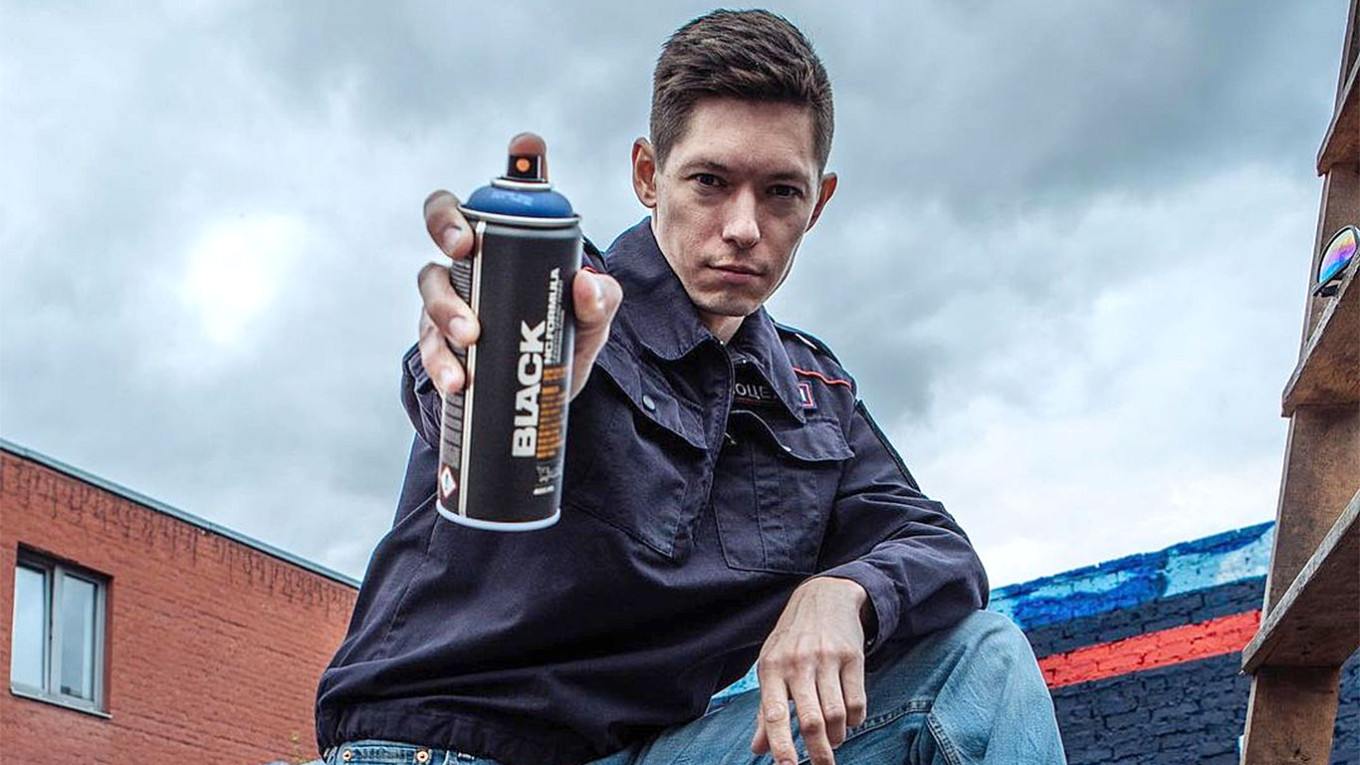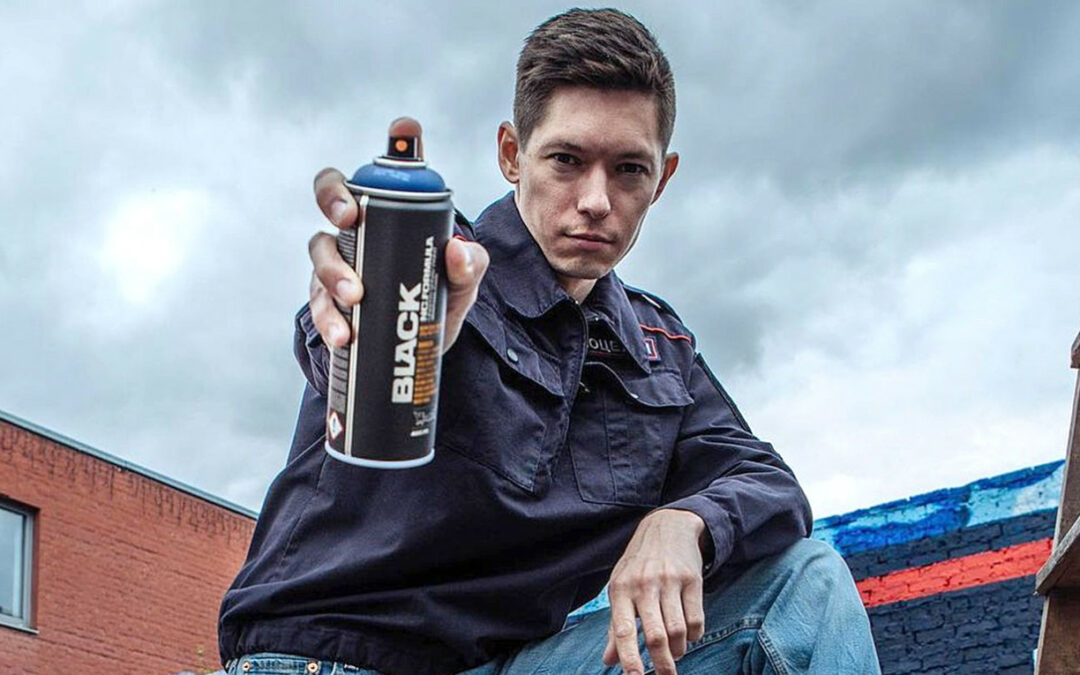Philippenzo
Graffiti Artist
Russia

Philippenzo is an exiled Russian artist who prefers to work under a pseudonym, emphasizing that his identity is not defined by his passport but by his art. Targeted for prosecution under Article 214.2 of the Russian Criminal Code—“vandalism motivated by political hatred”—Philippenzo’s works courageously tackle political themes, expressing his disdain for the Putin regime.
Born 1984, in Volgograd, Philippenzo is a prominent exiled Russian artist known for his street art and activism. He studied at the Volgograd Gymnasium No. 4 from 1991 to 2002 and later received further education at VolgGTU and the British Higher School of Design.
He began his journey as a street artist focused on three-dimensional artworks on asphalt. Philippenzo has also created transient art from puddles that vanish as the water dries and produces pixel canvases using his unique high-dripping technique. Influenced by the concept of “monstration,” his works often reflect societal commentary, incorporating themes of resistance and identity.
On July 29, 2023, upon returning to Moscow from Georgia, Philippenzo was detained at the airport and faced charges for disobeying police orders. Following a legal process that lacked proper legal representation, he was sentenced to 30 days of detention. By October 13, 2023, amid an ongoing criminal case for vandalism motivated by political hatred, he was forced to emigrate to Lithuania, where he continues to pursue his art, while the Russian authorities have placed him on their wanted list.
ARC Interview with Philippenzo
– You made your most famous anti-war works “Zinc is Ours” and “Izrossilovanie” (Russian Federapetion) when you were living in Russia and the laws on fakes had already been passed. Did you realize that this was dangerous?
I didn’t leave when the war started, and I wasn’t going to. Why should I leave my home? I had the best studio in the world, it was a place of power – energized me. Different events took place there, it was something like Studio 54, where among the canvases and paints, there were disco balls, neon lights, a projector.
I wanted to live in Russia and make anti-war works. I can’t not do them.
I should probably explain how I work. I don’t sit and think about what to paint – I’m just a relay of what’s in the air.
I think our specialty as artists is that we read societal, cultural vibes, moods more easily, plus our trained creative muscle allows us to give out what we’ve considered in a concentrated way. When the viewer thinks – yes, that’s exactly how I felt, I just didn’t know how to express it.
So, when the war started, I thought I’d keep working and get by with administrative fines. Fake laws were passed in the first few weeks to shut up the opinion leaders.
That’s how I did the artwork Zinc is ours. I immediately got two administrative fines. And another one for my posts on social media. The next one could have been a criminal case. So I lay low for a while.
On June 1st, Children’s Day, I did a work called Marshmallow. It is a work about how children in Russian schools and kindergartens are involved in the military agenda: they hold so-called Conversations about Important Things, line them up in the letter Z, and make them weave camouflage nets. In kindergartens and schools, criminals who have been released from prison in exchange for their participation in the war come to the children and tell them something, like heroes.
I made this work in Moscow, in the art cluster Vinzavod and it was immediately painted over.
And two weeks later I did a work called Izrossilovanie. I already realized then that this time the regime would not stop. I felt that I was doing everything right, I had come up with this work a year before, and now I realized that its time had come.
I did the work at dawn in a very good place that I had chosen long ago – on a bridge support that resembled the silhouette of the White House. It was already painted in the morning. I spent the whole day in the studio at the computer: I published the work, worked with huge feedback, and fought off an attack from pro-government Internet trolls.
When I got home, there was a policeman’s business card hanging on my door. I realized that my anonymity was exposed and the police knew where I lived. I called human rights activists, consulted and flew from Russia to Georgia. I spent several months there, I almost went crazy, I became depressed, I realized that I had to return to Russia to make a visa and go to the West.
– Did you manage to do that?
Right at passport control I was detained by the FSB. They took me aside, took my phone, didn’t explain anything, handed me over to the police, and told them to put me in jail for 15 days. Thanks to Artem Loskutov, my friend and colleague, journalists started following this situation. Finally, I was given another 15 days for disobeying police officers – I was allegedly not moving well from one cell to another. And the day before I was released, they opened a criminal case against me.
– It turns out that you spent about a month in a Russian prison. What were your impressions?
From the very beginning I decided to perceive it as an art residence – it was my first art residence in my life. I uderstood that I had two ways: to start worrying or to perceive the situation as an immersive performance.
Almost immediately, I spied a sheet and asked my friends to hand me the paints. The police didn’t bother me, because for a very long time they didn’t realize what was going on, this would be a special detention center on the outskirts of the city, probably I was the first political prisoner asking for pencils, brushes and paints.
At night my cellmate told me a prison joke that I was excited about. I jumped up and I told him – I will do an artwork out of this joke and – watch me — right from prison I will hold an auction and sell it.
Next thing you know, just like in gangster cartoons – I asked my friends to pass me a needle in a cup of instant noodles, dyed the sheet red and embroidered the joke on it.
While I was there the authorities opened a criminal case against me. As I found out later, they did it on my mom’s birthday.
And how did your cellmates treat you?
There were very different people there with me – someone robbed, someone actually killed someone. While walking in the small prison yard covered with a grate and a plastic roof, I often looked through the gap and saw the mast of a tower there. I imagined that it was the mast of a ship and that there was a sea beyond the prison wall.
And I would share this with the prisoners and they would smile ear to ear.
— How did you manage to leave Russia, since the criminal case against you had already been opened?
When I came out after these 30 days, almost immediately in the yard of my house I was attacked by people in black masks, they damaged my arm in all three joints, searched me, confiscated all my equipment, books about activist art, several works by contemporary artists, and all my travel documents. In two days I had to come for questioning. I promised that I would come.
That same day I contacted the girls from Pussy Riot. They connected me with people who help to leave even from house arrest. With their help I escaped to Armenia.
I spent some time in Yerevan, made documents, contacted human rights activists who helped me move to Europe.
— You look very active and active, how do you manage it?
This impression is deceptive, I have been depressed for four years now
There was a moment when I seriously thought about suicide – what to choose? Jump off a balcony or step in front of a subway train? The war affected me both directly and indirectly: I was left without a girlfriend, with debts, without studio neighbors, under the pressure of horrible news about murders in Ukraine and arrests in Russia.
All this time I was helped by my innate stubbornness. No matter how hard it is, I, like the great Gatsby, have this beacon light – the desire to be an artist, to be a good artist.
Why am I convinced that the universe has certain plans for me – because even in the most difficult moment, it threw me some resources. Yes, I lost a lot in exile, I’m depressed, I don’t have the opportunities I had before, but I can now discover Europe, I can participate in projects I couldn’t participate in before.
— Who is your audience now?
I focus on one audience only – myself. My reasoning is as follows: I am a perfectionist, which means that if I like what I do, many more people will like it. I realize that a European audience will not have access to what I do as a straight artist on the topics of dictatorship in Russia and war in Ukraine.
But I don’t only do these things. I paint in the neo-pop art genre on more universal themes. I have ideas for several new exhibitions. But I feel that I have to finish the subjects that have been thought up before. I have to close my commitment to the universe in this theme.
— How has yours changed as an artist in exile?
A friend of mine, a gallerist, called us – artists who left Russia for political reasons – not exiles, but envoys. I too see this role for myself: I can’t rehabilitate Russian culture, and I’m not sure it needs to be rehabilitated, but I would like to be an ambassador of creative Russian culture to the world.






